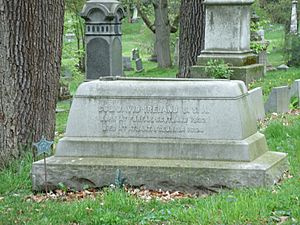David Ireland (colonel) facts for kids
Quick facts for kids
David Ireland
|
|
|---|---|

Gravesite photograph by Sarah Gath
|
|
| Born | May 9, 1832 Forfar, Scotland |
| Died | September 10, 1864 (aged 32) Atlanta, Georgia, U.S. |
| Place of burial |
Spring Forest Cemetery, Binghamton, New York
|
| Allegiance | United States Union |
| Service/ |
New York Militia United States Army Union Army |
| Years of service | 1858–1861 (New York) 1861–1864 (USA) |
| Rank | |
| Commands held | 137th New York Volunteer Infantry |
| Battles/wars | American Civil War |
David Ireland (born May 9, 1832 – died September 10, 1864) was a brave officer who became a colonel in the Union Army. This was the army that fought for the northern states during the American Civil War. Colonel Ireland was in charge of a group of soldiers called the 137th New York Volunteer Infantry. He played a very important part in defending a place called Culp's Hill during the famous Battle of Gettysburg.
Contents
David Ireland's Early Life
David Ireland was born in Forfar, Scotland, on May 9, 1832. When he was about eight years old, his family moved to New York in 1840. David learned to be a tailor, just like his father, in New York City.
In 1858, David joined a group of soldiers called the 79th Cameron Highlanders. This group was officially recognized by New York State in 1859. He worked as a clerk and later became an Adjutant for the 79th New York. An Adjutant is like a chief assistant to a commanding officer.
Joining the Civil War
When the Civil War began, David Ireland and his regiment, the 79th New York Volunteer Infantry, joined the Union Army. His first big battle was the First Battle of Bull Run. During this battle, their commander was killed, and many officers left. This caused some of the soldiers to become upset.
However, David Ireland took command of the 79th New York Infantry. He led his soldiers in a successful surprise attack against Confederate troops in Virginia. Because of this victory, he was promoted to captain. He then helped train new soldiers for the army.
In 1862, David Ireland was asked to lead a brand new regiment, the 137th New York Infantry. The governor chose him because of his "military experience and ability." People said he was a "kind and gentlemanly officer and a brave soldier." He trained his new soldiers very strictly in Binghamton, New York.
Key Battles and Leadership
Colonel Ireland and his 137th New York regiment joined the main Union army, called the Army of the Potomac. They were part of the XII Corps. Their first major fight was at the Battle of Chancellorsville.
Defending Culp's Hill at Gettysburg
One of Colonel Ireland's most famous moments was during the Battle of Gettysburg in July 1863. His regiment was placed at the very end of the Union battle line. They had to defend trenches on Culp's Hill.
On July 2, 1863, Confederate forces attacked Culp's Hill many times. Colonel Ireland's soldiers fought bravely and held their ground. They stopped the Confederate army from breaking through the Union lines. The fighting was very intense, and the 137th New York even made two bayonet charges to push back the enemy. They lost many soldiers, but they successfully defended their vital position.
Fighting in the Western Campaigns
Later in 1863, Colonel Ireland's corps was sent to help the Union army in Chattanooga, Tennessee. This area was in the western part of the war. When his brigade commander was wounded, Colonel Ireland took over leadership of the brigade.
He led his soldiers in important battles like the Battle of Lookout Mountain and the Battle of Ringgold Gap. These battles helped push the Confederate army out of Tennessee and into Georgia for the winter.
In 1864, several Union corps were combined into the XX Corps. Colonel Ireland continued to lead his brigade. He was wounded by a shell fragment during the Battle of Resaca in May 1864.
Colonel Ireland returned to lead his brigade in June 1864. He led them during the Atlanta Campaign, including the Battle of Peachtree Creek. His leadership was very important as the Union army advanced towards Atlanta.
Colonel Ireland's Legacy
After leading his brigade into Atlanta on September 2, 1864, Colonel Ireland became very sick with dysentery. He sadly passed away on September 10, 1864. His death was a great loss to the Union Army. His fellow officers said they regretted his "untimely death" on the "field of his fame and glory."
David Ireland is buried in Spring Forest Cemetery in Binghamton, New York. A group called the Sons of Union Veterans of the Civil War named a camp in Binghamton after him, called the "Col. David Ireland Camp." He had married Sara Phelps in 1863, but they did not have any children.
 | Georgia Louise Harris Brown |
 | Julian Abele |
 | Norma Merrick Sklarek |
 | William Sidney Pittman |

